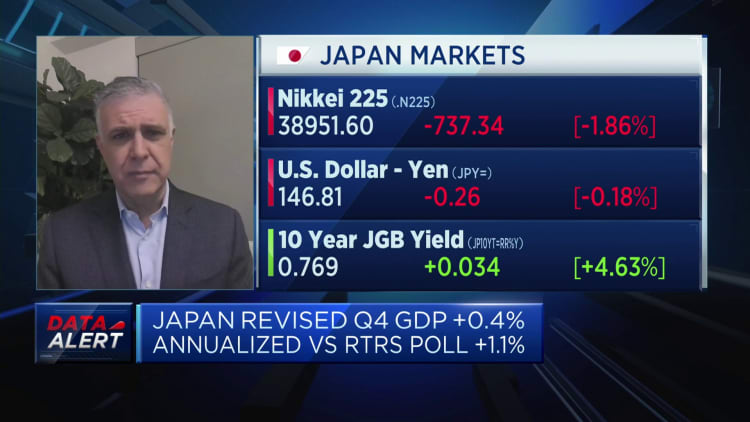Japan stocks led losses in the Asia-Pacific region after the country averted a technical recession, paving the way for its central bank to raise rates, while investors also assessed China's inflation numbers.
The Nikkei 225 closed 2.19% lower at 38,820.49 after falling almost 3%, led by technology stocks, as revised official data showed Japan's GDP expanded 0.4% in the October-December period last year.
The Topix declined 2.2% to 2,666.83, after falling about 3% earlier in the session.
Separately, China recorded its first month of inflation after four months of deflation with the country's consumer price index climbing 0.7% year on year in February.
The CPI, which had fallen 0.8% in January, and also beat expectations of 0.3% from economists polled by Reuters.
South Korea's Kospi slipped 0.77% to end at 2,659.84, while the small-cap Kosdaq rose 0.31% to finish at 875.93.
In Australia, the S&P/ASX 200 fell 1.82% to close at 7,704.2, retreating from its all-time high and snapping a three-day winning streak.
However, Hong Kong's Hang Seng index bucked the wider decline to gain 1.32%, while the mainland Chinese CSI 300 rose 1.25%, ending at 3,589.26
On Friday in the U.S., all three major indexes lost ground as with artificial intelligence darling Nvidia finishing down more than 5% in its worst session since late May.
Investors also assessed fresh data, with the Labor Department's Bureau of Labor Statistics reporting that nonfarm payrolls increased by 275,000 for the month while the jobless rate moved higher to 3.9%.
The S&P 500 lost 0.65%, while the Nasdaq Composite slipped 1.16%. Both swung into negative territory after rising to new all-time highs earlier in the session. The Dow Jones Industrial Average relinquished 0.18%.
— CNBC's Pia Singh and Alex Harring contributed to this report



